EPITOMES OF CORE BOOKS YOU MAY WANT TO READ
You may ask, Why condense pivotal books to a few pages? Should one not just read the originals? Summaries distort what they condense; these epitomes are no exception. Epitomizing forces one to decide an author’s meaning. Reframing an author’s thoughts aids recollection. Given the time constraints of higher education and life’s many demands, few read many books. Though time-starved, many, nevertheless, need the counsel unread texts impart. Epitomes provide a texture, if not the entire fabric, of important books and essays. As opportunity emerges, read originals.
Gottmann, John M. and Joan DeClaire. The Relationship Cure: A 5 Step Guide to Strengthening Your Marriage, Family, and Friendships. New York: Three Rivers Press, 2001.
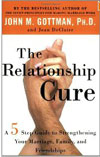
This book concerns how human relationship develop and improve, and contains a popularization of the neurological research of Jaak Panksepp, which may fundamentally alter the way you understand your own mind and relationships. Bid and respond; bid and respond. Click to read Brad's epitome of The Relationship Cure.
Stone, Douglas, Bruce Patton, Sheila Heen. Difficult Conversations: How To Discuss What Matters Most. New York: Penguin Books, 1999.
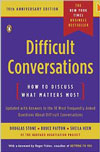
This book concerns conversations people avoid, ones laden with the possibility of conflict. These authors relate their learning at the Harvard Negotiation Project, and offer an approach to much-avoided conversations that promises a respectful dialogue and maybe even resolution. Click to read Brad's epitome of Difficult Conversations.
Pedro-Carroll, JoAnne. Putting Children First: Proven Parenting Strategies for Helping Children Thrive Through Divorce. New York: Penguin Group, 2010.
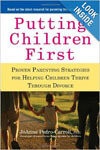
JoAnne Pedro Caroll, Ph.D., is a clinical psychologist and collaborative practitioner in Rochester, New York. This book emphasizes the effects of divorce on children. Dr. Pedro-Carroll helps with parental strategies that minimize those often deleterious impacts. Dr. Pedro-Carroll's website is www.pedro-carroll.com, which site offers other helpful information and links. Click to read Brad's epitome of Putting Children First (presently incomplete). Click to read Dr. Pedro-Carroll's thoughts on when and how to tell your children about your impending divorce.
Pillemer, Karl. 30 Lessons for Living: Tried and True Advice from the Wisest Americans. New York: Hudson Street Press, 2011.
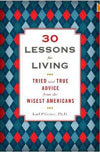
Karl Pillemer, Ph.D., is a gerontologist who teaches at Cornell University in human development. Dr. Pillemer is a driving force behind The Legacy Project, which seeks to learn and disseminate the wisdom of American elders. You will learn what more than 1,000 American elders over sixty-five years of age have to teach about life, marriage, parenting, work, aging, and death. Click to read Brad's epitome of 30 Lessons for Living.
Keltner, Dacher. Born to Be Good: The Science of a Meaningful Life. New York: W. W. Norton & Company: 2009.
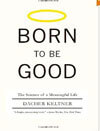
This book concerns human evolutionary propensities to be and do good. Keltner argues that humans are hard-wired to create meaningful life. It may help you think differently about human failings, sin, and your own shortcomings, as well as to be optimistic about your potential for creating a life you value. Click to read Brad's epitome of Born to Be Good.
Block, Peter. Community: The Structure of Belonging. San Francisco, California: Berrett-Koehler Publishers, Inc., 2008.
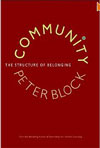
Peter Block's book concerns human community, why our culture injures community, and how to create better communities. Block's view of transformative community closely parallels the attitudes and beliefs that most collaborative practitioners share about their work with people in disputes. Click to read Brad's epitome of Community.
Gottman, John and Nan Silver. Seven Principles For Making Marriage Work. New York: Random House, 1999.
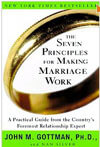
John Gottman researches human relationships at the University of Washington. He runs the “love lab,” an apartment overlooking Portage Bay, across the canal from the University. There couples stay the weekend, subject to constant surveillance, except for bed and bath. Based upon years of examining these electronic records, Dr. Gottman writes of seven principles that make marriage work. His book is Seven Principles For Making Marriage Work.
Buber, Martin. I and Thou. Translated by Walter Kaufmann. New York: Charles Scribner’s Sons, 1970.
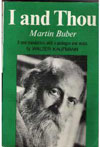
Martin Buber was a Jewish philosopher who explored the depths of relationships and their root in his broad ecumenical conception of the divine. This is not a book that promotes a particular religion, but rather one that helps me think deeply about the critical role of meeting others where and as they are. Click here to read Brad's epitome of I and Thou.
Karen, Robert. Becoming Attached: First Relationships and How they Shape Our Capacity For Love. New York: Oxford University Press, 1998.
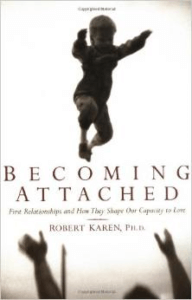
Robert Karen writes of the relationship between primary caregivers and their infant children. That bond, attachment theorists assert, shapes the emotional expectations of young children, and, when the relationship goes awry, creates forms of insecure attachment that plague those children, ringing through generations. Click here to read Brad's epitome of Becoming Attached.
Gawande, Atul. Being Mortal: Medicine and What Matters in the End. New York: Henry Holt and Company, 2014.
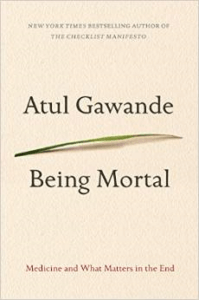
Atul Gawande, surgeon, writes of the interface between terminal illness and the medical community. He argues that that people with terminal illness need to make their lives as meaningful as possible during their last days. Perhaps many should decline to let the medical community take over the shape and quality of life in these patients' final days, choosing rather to express their own values and preferences. Click here to read Brad's epitome of Being Mortal.

